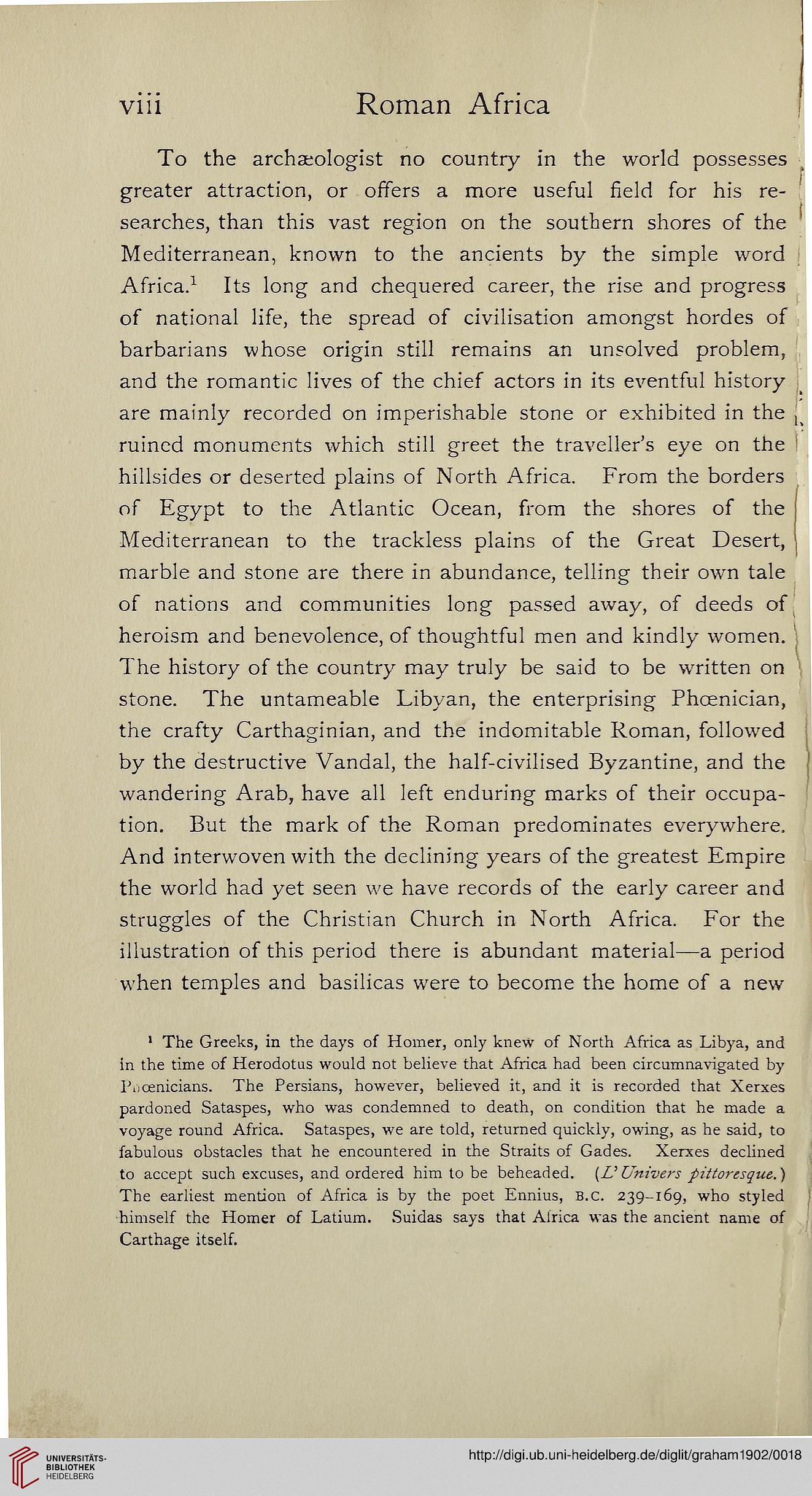Vlll
Roman Africa
To the archaeologist no country in the world possesses
greater attraction, or offers a more useful field for his re-
searches, than this vast region on the southern shores of the
Mediterranean, known to the ancients by the simple word
Africa.1 Its long and chequered career, the rise and progress
of national life, the spread of civilisation amongst hordes of
barbarians whose origin still remains an unsolved problem,
and the romantic lives of the chief actors in its eventful history
are mainly recorded on imperishable stone or exhibited in the {
ruined monuments which still greet the traveller's eye on the i
hillsides or deserted plains of North Africa. From the borders
of Egypt to the Atlantic Ocean, from the shores of the
Mediterranean to the trackless plains of the Great Desert,
marble and stone are there in abundance, telling their own tale
of nations and communities long passed away, of deeds oF
heroism and benevolence, of thoughtful men and kindly women.
The history of the country may truly be said to be written on
stone. The untameable Libyan, the enterprising Phoenician,
the crafty Carthaginian, and the indomitable Roman, followed
by the destructive Vandal, the half-civilised Byzantine, and the
wandering Arab, have all left enduring marks of their occupa-
tion. But the mark of the Roman predominates everywhere.
And interwoven with the declining years of the greatest Empire
the world had yet seen we have records of the early career and
struggles of the Christian Church in North Africa. For the
illustration of this period there is abundant material—a period
when temples and basilicas were to become the home of a new
1 The Greeks, in the days of Homer, only knew of North Africa as Libya, and
in the time of Herodotus would not believe that Africa had been circumnavigated by
Phoenicians. The Persians, however, believed it, and it is recorded that Xerxes
pardoned Sataspes, who was condemned to death, on condition that he made a
voyage round Africa. Sataspes, we are told, returned quickly, owing, as he said, to
fabulous obstacles that he encountered in the Straits of Gades. Xerxes declined
to accept such excuses, and ordered him to be beheaded. {V Univers pittorcsque.)
The earliest mention of Africa is by the poet Ennius, B.C. 239-169, who styled
himself the Homer of Latium. Suidas says that Alrica was the ancient name of
Carthage itself.
Roman Africa
To the archaeologist no country in the world possesses
greater attraction, or offers a more useful field for his re-
searches, than this vast region on the southern shores of the
Mediterranean, known to the ancients by the simple word
Africa.1 Its long and chequered career, the rise and progress
of national life, the spread of civilisation amongst hordes of
barbarians whose origin still remains an unsolved problem,
and the romantic lives of the chief actors in its eventful history
are mainly recorded on imperishable stone or exhibited in the {
ruined monuments which still greet the traveller's eye on the i
hillsides or deserted plains of North Africa. From the borders
of Egypt to the Atlantic Ocean, from the shores of the
Mediterranean to the trackless plains of the Great Desert,
marble and stone are there in abundance, telling their own tale
of nations and communities long passed away, of deeds oF
heroism and benevolence, of thoughtful men and kindly women.
The history of the country may truly be said to be written on
stone. The untameable Libyan, the enterprising Phoenician,
the crafty Carthaginian, and the indomitable Roman, followed
by the destructive Vandal, the half-civilised Byzantine, and the
wandering Arab, have all left enduring marks of their occupa-
tion. But the mark of the Roman predominates everywhere.
And interwoven with the declining years of the greatest Empire
the world had yet seen we have records of the early career and
struggles of the Christian Church in North Africa. For the
illustration of this period there is abundant material—a period
when temples and basilicas were to become the home of a new
1 The Greeks, in the days of Homer, only knew of North Africa as Libya, and
in the time of Herodotus would not believe that Africa had been circumnavigated by
Phoenicians. The Persians, however, believed it, and it is recorded that Xerxes
pardoned Sataspes, who was condemned to death, on condition that he made a
voyage round Africa. Sataspes, we are told, returned quickly, owing, as he said, to
fabulous obstacles that he encountered in the Straits of Gades. Xerxes declined
to accept such excuses, and ordered him to be beheaded. {V Univers pittorcsque.)
The earliest mention of Africa is by the poet Ennius, B.C. 239-169, who styled
himself the Homer of Latium. Suidas says that Alrica was the ancient name of
Carthage itself.




